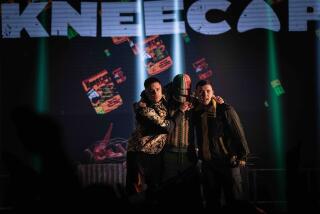A Remembrance of Dad at Irish Fest
- Share via
I celebrated Father’s Day a week early at the Grand National Irish Fair and Music Festival. I saw the turn of my father’s head and the sun highlighting the high cheekbones of his Connemara face in at least 100 men. Though none of them had the Galway Bay blue of his eyes, not just that blue.
It was a good place to be, the week before Father’s Day, at the Los Angeles Equestrian Center, where the Irish Fair was celebrating its 15th year of Irish crafts, music, storytelling, mock battles, dogs and horses.
The 75 acres of the Equestrian Center are transported across centuries to become an Irish settlement that wakes up once a year. There are kings, queens, knights, men-at-arms, courtiers and royalty, chieftains and dancers for the two days of the festival.
The pageant opened with a royal parade with elaborately costumed players. This prancing, laughing throng, was led in by a band of pipers, playing the saddest of all music, the tales sung of battles lost and loves misplaced down the years.
Each year, there are three or four pipe bands, chosen from the best. At the start of the parade, the first band, military in navy-blue and green kilts, opened the festival with that saddest song of all, sadder to me than “Danny Boy,” which is guaranteed to reduce any bunch of Irishmen to a puddle of heartbreak.
They opened with Thomas Moore’s “Minstrel Boy,” with its words as sad as the winds through the crumbling towers of a castle in Donegal.
It goes like this, and if you can hear it, or read it, without having a knife turn in your heart, you’re of some other breed. You don’t have to be Irish to grieve for youth going forth blazing with high purpose and coming back at sundown on his shield.
The Minstrel Boy to the war is gone.
In the ranks of death you’ll find him;
His father’s sword he has girded on,
And his wild harp slung behind him.
It goes on to tell of the death in battle of the minstrel boy and how he tore the strings from his battle harp so no enemy would ever play on it anything but songs for the brave and the free, nor sound the dirge of slavery.
Daddy used to sing “Minstrel Boy” in his bass voice, sounding like the surf pounding beneath the Cliffs of Moher. And he whistled it like a lark in the meadow. It has a sad, minor note every word or two, which takes the heart out of you--or makes you want to gather in the glen with the boys and their pikes.
In Ireland, I once saw the Connemara ponies. There was a band of them in a pasture outside our window, 30 little horses with woolly coats that had not been groomed for the show ring. They wore their coats for warmth against the cold Atlantic winds that blew over the estuary and across the pastures, flattening the grass, and howling like a soul in torment.
The ponies we saw Sunday at the festival looked nothing like the Irish ponies. These were magnificent horses, one of which was the original Connemara dun color with black legs. The rest were all colors, satin black, chestnut, dapple gray, one white as milk and one that glistened richly as a pearl.
No one knows where the ponies came from, but they settled in Galway and bred with the strong Celtic horses. The American Connemaras are larger than their Irish cousins. They are “soft-gaited with a courageous spirit.”
There was a replica of Tara, the castle of the high Irish kings, with knights and maidens going about their work and pleasure as the Irish did centuries ago.
Brian Boru was the mythical host of the festival, he who united the scattered tribes of Ireland against the marauding Vikings. From my father, I knew Brian Boru better than the stories of the three bears or Cinderella.
It was a delightful pre-Father’s Day celebration, remarkable entirely in its lack of fakery and hokum. The entertainment was the nonpareil Tommy Makem and Eugene Byrnes, the Clancy Brothers and Robby O’Connell.
Tommy Makem had a wonderful line. He told a story about some tough old nuns who gave due meaning to the word discipline. He concluded it by paying tribute to their steadfastness. Anyone who has ever gone to school through a nun like that will never forget a thing she said. Makem ended his story by saying “that’s what the Marines need, a few good nuns.”
My father had a sister who was an Immaculate Heart nun of that type. She was not unfair. She simply expected to be listened to when she spoke. And she was. My aunt, Sister Mary Bridges, and my father were well-remembered at the Irish Fair. I felt him in front of me, just there through the crowd, all the fine, soft day.
More to Read
Sign up for The Wild
We’ll help you find the best places to hike, bike and run, as well as the perfect silent spots for meditation and yoga.
You may occasionally receive promotional content from the Los Angeles Times.






